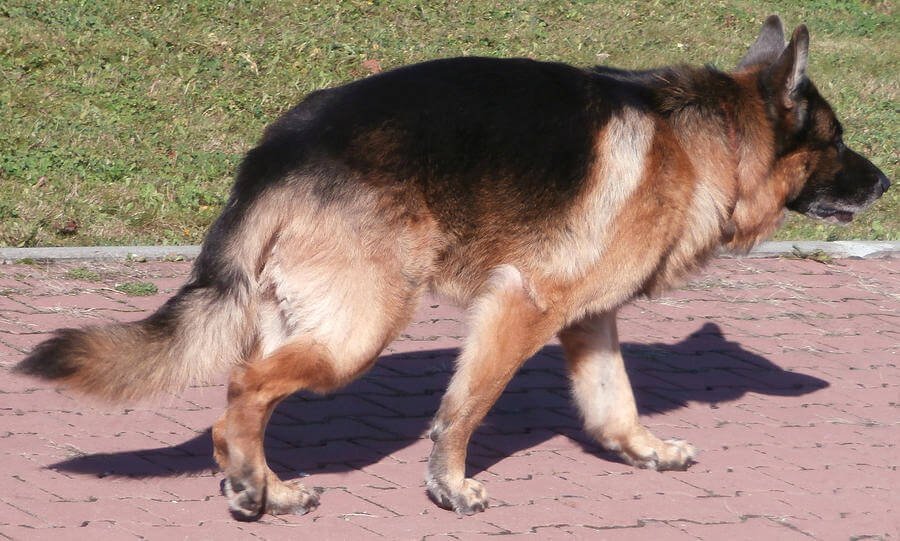Is a German Shepherd the right dog for me? The decision you are about to make needs very careful consideration, as choosing the right German Shepherd dog is a huge responsibility and commitment – as in fact, it is to take on any breed of dog, whether a puppy or an older dog:
so please take time to do your research.
Table of Contents
Is a German Shepherd the right dog for me? Key things to consider

- Lifestyle: Think about your lifestyle, as German Shepherds are social animals and do not like being left alone for long periods of time. The general rule of thumb is that your dog should not be left for more than four hours a day, although this will vary with his age.
- Space: Think about your home and whether it can accommodate a large breed dog. Not only will your dog like to have his own space within the home, but a German Shepherd is not well suited if you live in a flat with no outdoor space where he can stretch his legs in between walks and where will he go to the toilet on that occasional day you feel too unwell to take him out for a walk?
Also Read: 4 Best Dog Boots for Injured Paws Waterproof in UK [Buyer Guide and Tips]
If in a flat, what floor are you on, and do you have stairs or a lift? Older Shepherds can struggle with stairs.
- Money: Apart from the initial cost of obtaining your German Shepherd, and essential equipment such as collars, leads, bowls and bedding, the ongoing costs can soon add up, bearing in mind that these dogs can live to an average of twelve years.
Consider these things while choosing a German shepherd

- Food: Look into the costs of good quality dog food.
- Insurance: Ensure you have a minimum of third party cover for your dog, and look into the options that are on offer to cover accidental and medical health problems. Check out what excesses apply. Most insurers will allow you to pay by monthly direct debit at no additional cost.
- Vet bills and costing: Insurance will not cover you for routine healthcare for your dog such as yearly vaccinations, having your dog neutered, or having his teeth cleaned. If you have not taken out insurance, will you have the finances to cover an emergency operation if required, which can run into hundreds and sometimes thousands of pounds. Does your vet offer a health plan payable monthly?
- Kennels or pet sitter or Dog Boarding Centres: Where will your dog go when you are on holiday? If he is lucky enough to go with you, then this is not so much of an issue, but if you jet off regularly once a year to warmer climates, consider the care costs.
- Time: German Shepherds are active animals and need a considerable amount of exercise every day depending on their age. Your dog will need training and socialization with people and other animals. Media hype means that many people are wary of them when out in public, and whilst much of the press is exaggerated and inaccurate, it is our responsibility as German Shepherd owners to dispel these fears by ensuring that our dog is well mannered and obedient when out and about.
- Cleanliness: Despite regular grooming, your German Shepherd will moult, and sometimes it can feel that this occurs 365 days of the year. They also have a tendency to love water and mud, and always save shaking themselves off until they are in the house. If you are house proud, this is not the dog for you. and proper potty training also helps in maintaining the cleanliness
TO BUY OR TO RESCUE? Wherever you get your German Shepherd from, there are some very simple rules to follow:
- Never buy a dog from an advert where more than one breed is advertised, as it is very likely that the advertiser is breeding unscrupulously, purely for financial gain
- Never buy from an advert where an individual is selling or giving up their dog due to a change in circumstances unless you are sure they will allow you several visits and will take the dog back should there be a problem.
- Unfortunately, the reality is that many people use this form of advertising to offload a ‘difficult’ dog, with problems usually of their own making
- Never buy from a pet shop as these are outlets for ‘puppy farms’, again unscrupulous breeders whose only interest is in money and not the welfare of the dogs
- Never buy a dog on an impulse – for example, from the man down the pub who has to sell his dog
Comparison of a German shepherd with other breeds
here is a chart on the characteristics of German Shepherds compared with Dobermans, Rottweilers, Golden Retrievers, and Pitbull:
| Characteristic | German Shepherd | Doberman Pinscher | Rottweiler | Golden Retriever | Pit Bull |
|---|---|---|---|---|---|
| Origin | Germany | Germany | Germany | Scotland | United States |
| Height | Male: 22-26 inches (56-66 cm) | Male: 24-28 inches (61-71 cm) | Male: 24-27 inches (61-69 cm) | Male: 22-24 inches (56-61 cm) | Male: 18-21 inches (46-53 cm) |
| Weight | Male: 65-90 pounds (29-41 kg) | Male: 60-80 pounds (27-36 kg) | Male: 100-130 pounds (45-59 kg) | Male: 65-75 pounds (30-34 kg) | Male: 30-60 pounds (14-27 kg) |
| Lifespan | 10-13 years | 10-13 years | 8-10 years | 10-12 years | 12-16 years |
| Temperament | Intelligent, loyal, protective | Intelligent, alert, loyal | Intelligent, confident, protective | Friendly, gentle, outgoing | Intelligent, playful, affectionate |
| Energy level | High | High | High | Medium | High |
| Trainability | Easy to train | Easy to train | Easy to train | Easy to train | Moderately easy to train |
| Grooming needs | Moderate | Moderate | Moderate | Low | Moderate |
| Health issues | Hip dysplasia, elbow dysplasia, bloat, allergies | Hip dysplasia, elbow dysplasia, heart disease, cancer | Hip dysplasia, elbow dysplasia, bloat, cancer | Cancer, heart disease | Skin allergies, hip dysplasia |
| Suitability for families | Good | Good | Good | Good | Good |
| Suitability for first-time owners | Good | Good | Good | Good | Not recommended |
Notes:
- This is a general overview of the characteristics of these breeds. Individual dogs may vary in temperament and other traits.
- It is important to do your research before choosing a breed of dog to ensure that it is a good fit for your lifestyle and personality.
- If you are considering a German Shepherd, Doberman Pinscher, Rottweiler, Golden Retriever, or Pit Bull, be sure to talk to a reputable breeder or rescue organization to learn more about the breed and its specific needs.
How to Choose the right Breeder for a German Shepherd
- The breeder should allow you to see a mom with her litter of pups. This is very important, and you should never buy a puppy from anywhere you are not allowed to meet mum, whatever reason they give. Seeing the mother and assessing her temperament will give you an idea of how the pups should be in terms of temperament, size, and characteristics
- If dad is also owned by the same breeder, you should ask to meet him. This is not always possible, as stud dogs are not always owned by the same person. However, breeders of good repute will be happy to show off one or both parents
- Ideally, pups should have been raised in the home of the person selling them, rather than in a kennel or barn, otherwise, they cannot have had enough experience of everyday life or contact with people and the domestic environment
- You should be allowed to handle and meet the whole litter rather than just being shown the pup that may be intended for you. This allows you to assess your pup against its siblings in terms of size, characteristics, and confidence. This is also a good test of mum’s temperament as she should be happy to allow visitors to handle her pups and not be worried when you pick them up and play with them
- Visiting a number of times should also be welcomed by a breeder – though remember that too many visits can become an inconvenience
- Ask the breeder for a copy of their contract of sale. A reputable breeder will provide this, and it should include details of both the breeder’s and your responsibilities to the puppy. It should also list any Kennel Club endorsements (restrictions) that have been placed on the pup’s record, and under what conditions they may be prepared to remove them. Such endorsements may include that your puppy is not for breeding, or not for export
- Take time to chat with the breeder about vaccinations, microchipping, worming, flea treatments, feeding, and exercise. Written advice on all of this should be supplied by the breeder, but it is good to go through it to ensure you are totally clear on when and if pup may need his next vaccination
- The breeder should also provide you with a pedigree detailing your pup’s ancestry; this can be handwritten or printed by the breeder, or an official one from the Kennel Club
- Breeders should also supply copies of any additional health certificates held for Mum and dad. German Shepherds are prone to a number of hereditary diseases and it is important you are aware of these conditions so know the right questions to ask. Nowadays some dogs are also DNA tested for certain conditions
- Ask at what age you can take your puppy home. The ideal age is eight weeks, but many breeders will let you take the pup home from six weeks. A pup should never leave its mother or siblings any younger than this.
Conclusion
It’s always a good to go for German shepherd provided proper time, space, and adaptability towards the breed. please do proper research on the breed and food habits and go ahead.

